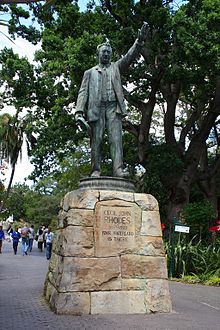Problem
Somebody wants to remove the statue of Cecil Rhodes in Cambridge, England. Even a student who is a Rhodes scholar wants the state removed.
Over in the USA somebody wants - several somebodies want - to remove the statue of General Robert E Lee who led the South in the Civil War.
I was surprised to hear that. I lived in America. I was led to believe that General Lee said that he supported the views of the north but he would not allow them to invade the south.
During his lifetime he was highly respected. However, some of the actions taken my himself and his army do not harmonies with the lot things he said.
Napoleon
All our museums are full of paintings and statues of kings and emperors and generals who were not liked by the other side. Take Napoleon. We have a statue of him in London, in the home of Wellington. The story goes that Wellington had the statue of Napoleon made larger than life so that when he met Napoleon, a man of short stature, he would be emboldened by seeing that the real life Napoleon was so much smaller than the Napoleon everybody feared.
Cromwell
Feelings about people blow one way then the other. Cromwell, for example, known as the man who killed the king, and the man who cancelled Christmas. On the other hand, you could argue that he signed the death warrant reluctantly, after much attempted delay, only one of many signers, was sensible, refused to be a king, and was tolerant and improved trade in the national of shopkeepers by letting the Jews back into England.
It seems to me that a satisfactory compromise would be to move any controversial statue from a prominent outdoor positions and put it inside gated compounds or better still indoors inside museums.
What about all the Greeks and Romans and pagans? We would lose so many statues and busts, so many tourist sites, if we allowed ourselves to remove statues on moral ground.
Yes, a statue which is unpopular today should be taken into police protection, to protect it, for its own safety.
Henry VIII
What about Henry VIII and the monasteries? What would Amnesty International say about the way Henry treated his wives?
What happened to early statues of Jesus and saints and the bones and bodies of saints? Whenever you see a potential attack, destruction, or theft, if anybody wants to hide a book or statue or painting, they whisk it away. It goes into a church for safekeeping, hidden in a back room, in a basement or underground. Alternatively, if there's no church, you build a church around it.
What about Hitler? I would not want a statue of Hitler in a main square, suggesting that he was venerated. But a museum about a city's history, or the war and the Nazi era, could well have a statue or portrait, showing how Hitler and others looked at the time.
Let us go back to our banned or at risk statues. Why should you care? I want to see what Alexander the Great looked like. And Robert E Lee. And Cecil Rhodes.
Cecil Rhodes Statue, Cape Town, South Africa. Photo from Wikipedia, author KNewman1.
Why should you go and see these at risk statues now? Because you might not get another chance.
Rhodes
1 See the equestrian statue of Cecil Rhodes in Cape Town, South Africa. The nearby bust in the wall was vandalised, with the nose damaged.
2 Statue above, of Rhodes standing.
Lee
1 The statue of Robert E Lee, in Lee Park, like the one of Stonewall Jackson in Jackson Parks was covered in tarpaulin, October 11th, 2017, according to reports not the Save Robert E Lee page in Facebook.
2 Statue of Robert E Lee, equestrian, Charlottesville, Virginia.
3 Statue of Lee in Gettysburg, Pennsylvania. (Scene of the battle, and where President Lincoln gave his address or speech.)
4 Statue of Lee in Texas Austin (standing).
5 Statue of Lee in Dallas, Texas.
6 Statue of Lee in chapel on the campus of Washington and Lee University.
When we toured around Virginia and visit Gettysburg I saw the statue of Lee in the chapel. I don't think it dawned on me at the time what a VIP he had been as head of the university. The Wikipedia article shows all the statues and gives a very readable account of Lee's life. An even clearer and more succinct story is told about Lee and his life in Find a Grave
The bust of Robert E Lee was removed from the Hall of Fame in New York by a mayor.
Lee's famous horse was called Traveller. If these statues vanish, you can still enjoy reading about Civil War times on the internet.
Glossary (fancy word for dictionary)
equestrian - on horseback
Angela Lansbury, travel writer and photographer, author and speaker. Please save links to your favourite posts.











No comments:
Post a Comment